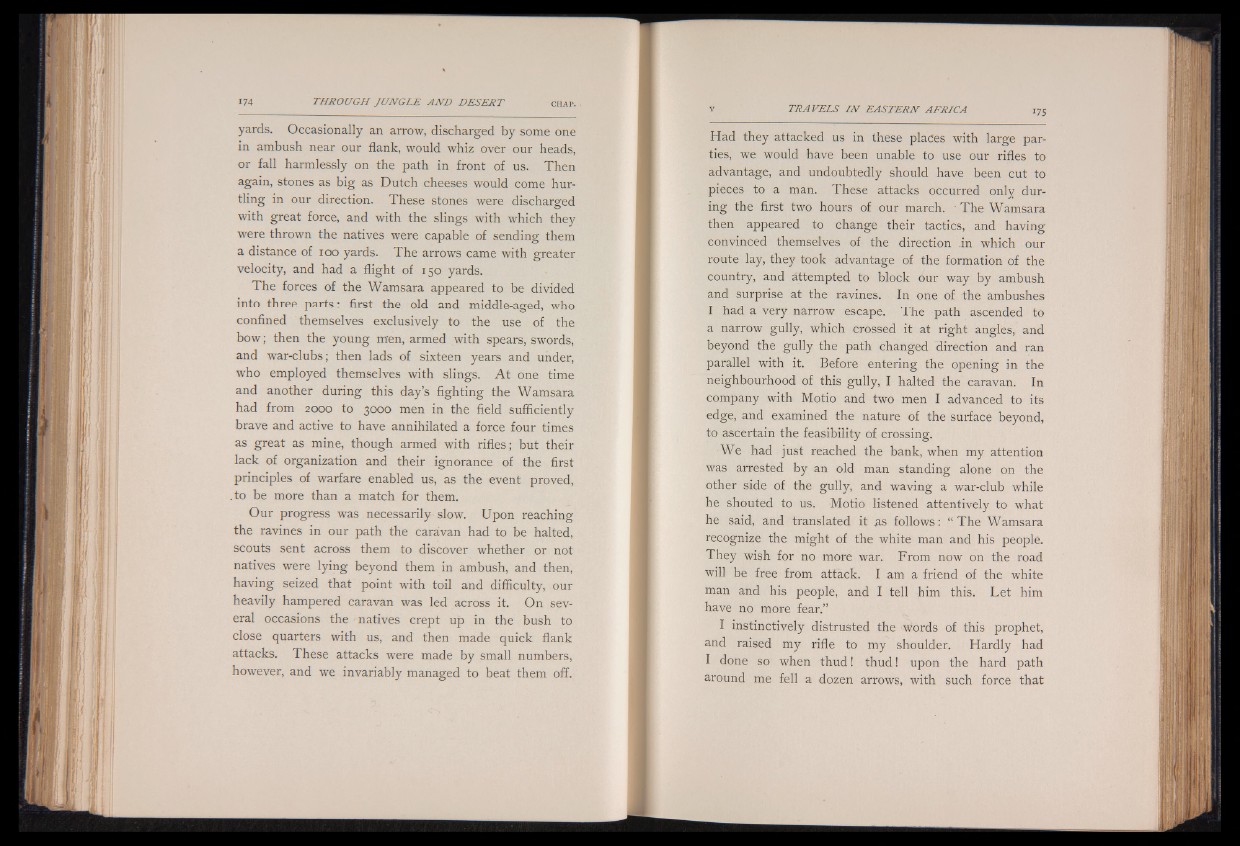
yards. Occasionally an arrow, discharged by some one
in ambush near our flank, would whiz over our heads,
or fall harmlessly on the path in front of us. Then
again, stones as big as Dutch cheeses would come hur-
tling in our direction. These stones were discharged
with great force, and with the slings with which they
were thrown the natives were capable of sending them
a distance of 100 yards. The arrows came with greater
velocity, and had a flight of 150 yards.
The forces of the Wamsara appeared to be divided
into three parts: first the old and middle-aged, who
confined themselves exclusively to the use of the
bow; then the young m'en, armed with spears, swords,
and war-clubs; then lads of sixteen years and under,
who employed themselves with slings. A t one time
and another during this day’s fighting the Wamsara
had from 2000 to 3000 men in the field sufficiently
brave and active to have annihilated a force four times
as great as mine, though armed with rifles; but their
lack of organization and their ignorance of the first
principles of warfare enabled us, as the event proved,
.to be more than a match for them.
Our progress was necessarily slow. Upon reaching
the ravines in our path the caravan had to be halted,
scouts sent across them to discover whether or not
natives were lying beyond them in ambush, and then,
having seized that point with toil and difficulty, our
heavily hampered caravan was led across it. On several
occasions the natives crept up in the bush to
close quarters with us, and then made quick flank
attacks. These attacks were made by small numbers,
however, and we invariably managed to beat them off.
Had they attacked us in these places with large parties,
we would have been unable to use our rifles to
advantage, and undoubtedly should have been cut to
pieces to a man. These attacks occurred only during
the first two hours of our march. • The Wamsara
then appeared to change their tactics, and having
convinced themselves of the direction .in which our
route lay, they took advantage of the formation of the
country, and attempted to block Our way by ambush
and surprise at the ravines. In one of the ambushes
I had a very narrow escape. The path ascended to
a narrow gully, which crossed it at right angles, and
beyond the gully the path changed direction and ran
parallel with it. Before entering the opening in the
neighbourhood of this gully, I halted the caravan. In
company with Motio and two men I advanced to its
edge, and examined the nature of the surface beyond,
to ascertain the feasibility of crossing.
We had just reached the bank, when my attention
was arrested by an old man standing alone on the
other side of the gully, and waving a war-club while
he shouted to us. Motio listened attentively to what
he said, and translated it as follows: “ The Wamsara
recognize the might of the white man and his people.
They wish for no more war. From now on the road
will be free from attack. I am a friend of the white
man and his people, and I tell him this. Let him
have no more fear.”
I instinctively distrusted the words of this prophet,
and raised my rifle to my shoulder. Hardly had
I done so when thud! thud! upon the hard path
around me fell a dozen arrows, with such force that